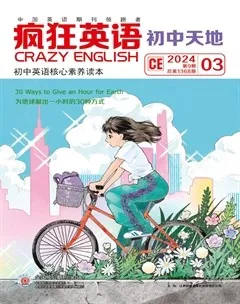Li Qingzhao:The Greatest Female Talent in History李清照:千古第一才女
朱广春
李清照,中国南宋时期著名女词人,以清丽绝俗的词作和悲凉感伤的题材而著称,被誉为“千古第一才女”。让我们一起走进这位文学巨匠的生平和诗文,感受她文字所带来的情感共鸣。
Li Qingzhao(1084–about 1155) was a great woman writer secondto none in the history of Chinese literature and a famous poet in theSouthern Song Dynasty, who is also honored as “the greatest femaletalent in history”.
Li Qingzhao was born in the current city of Jinan, ShandongProvince. Her father Li Gefei was a writer and calligrapher of theNorthern Song Dynasty. Compared with other young women of similarsocial status in her time, she grew up in a family with a 1)relativelyrelaxed atmosphere, and she was free in both character building andartistic development.
In her youth, Li Qingzhao and her husband Zhao Mingchenghad a poetic love; in her middle age, they 2)drifted from place toplace together and witnessed the shattering of the country. ZhaoMingcheng died of illness on his way southward after beingappointed to a new position. In her later years, Li Qingzhaoslife was full of 3)frustrations and she quietly passed away inloneliness and agony.
Li Qingzhaos ci is full of sense and sensibility,4)depicting themes such as love, country and society,and the vicissitudes of life, etc. They fullydemonstrate her boldness in love andhate, her concerns for the countryand the people, and her loftysentiments and aspirations.They showcase the noblequalities of a patriotic poetand the far-sightedness,insight and excellent creativityof an outstanding writer.
词组加油站
second to none 首屈一指
pass away 逝世
1) relatively adv. 相对地
2) drift v. 缓慢移动; 漂泊
3) frustration n. 挫折
4) depict v. 描绘
Li Qingzhao is also familiar with epigraphy,painting and calligraphy. She cooperated with ZhaoMingcheng to compile Jin Shi Lu, which becomes oneof the earliest epigraphy catalogues and researchmonographs in China. In the book, her comments areunique and play an important role in promoting thestudy of ancient Chinese cultural relics. The Epilogueto Jin Shi Lu, written by Li Qingzhao herself, is a document with greathistorical value.
Zang Kejia, a famous contemporary poet, once described LiQingzhao as follows: “A flower has been in full blossom for hundreds ofyears in the ci garden.” The flower not only bloomed through the flowerseason of Chinese poetry, but also bloomed again on Mercury in thesolar system over 800 years later. In 1987, the International AstronomicalUnion named the first group of 15 craters on Mercury with renownednames in human history, and Li Qingzhao was one of them, whichproves what great influence and charm she deserves.
李清照(1084—約1155),中国文学史上首屈一指的伟大女作家,南宋著名女词人,被誉为“千古第一才女”。
李清照出生在今天的山东省济南市。父亲李格非是北宋文学家、书法家。与同时代其他社会地位相近的年轻女性相比,她成长在一种相对无拘束的家庭氛围中,在性格塑造和才艺养成上都很自由。
青年时,李清照与丈夫赵明诚有过如诗般的爱情;中年时,他们颠沛流离,看到国家山河破碎。在南下赴任的途中,赵明诚染病身亡。晚年时,李清照的生活充满坎坷,在孤独苦闷中悄然离世。
李清照的词充满了情感与理智,描写了爱情、家国社会、人生沧桑等主题,尽显了她敢爱敢恨、忧国忧民的性格及其豪情壮志,表现出一位爱国词人的崇高品质和一位杰出文学家的远见卓识与卓越创造力。
和羞走,倚门回首,却把青梅嗅。
——《点绛唇·蹴罢秋千》
此情无计可消除,才下眉头,却上心头。
——《一剪梅·红藕香残玉簟秋》
物是人非事事休,欲语泪先流。
——《武陵春·春晚》
莫道不销魂,帘卷西风,人比黄花瘦。
——《醉花阴·薄雾浓云愁永昼》
寻寻觅觅,冷冷清清,凄凄惨惨戚戚。
——《声声慢·寻寻觅觅》
生当作人杰,死亦为鬼雄。
——《夏日绝句》
李清照还通晓金石书画。她与赵明诚合作编写了《金石录》,这是中国最早的金石学目录和研究专著之一。书中,她的评论独树一帜,对推动中国古代文物研究起到了重要作用。李清照独自撰写的《金石录后序》更是一篇极具重要史料价值的文献。
当代著名诗人臧克家曾这样形容李清照:“词苑千载,群芳竞秀,盛开一枝女儿花。”这枝花不但绚烂了中国诗词的整个花季,而且八百多年后再度绽放在太阳系水星之上:1987 年,国际天文学联合会将水星上的第一批15 座环形山分别用人类历史上著名人物的名字来命名,其中包括李清照,这彰显了她的巨大影响力和魅力。

